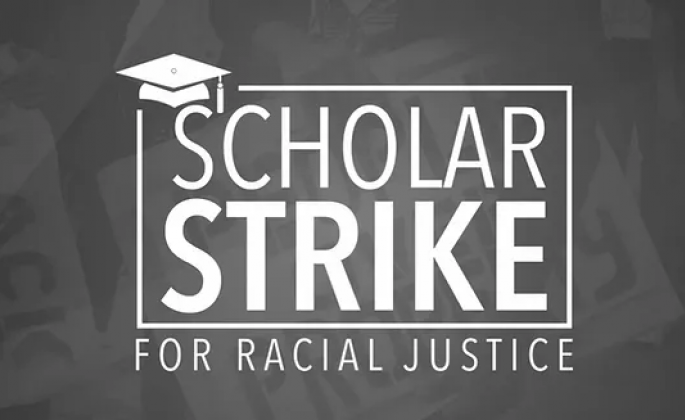Georgetown University professors held teach-ins on anti-racist topics for two days instead of holding class as part of the first nationwide Scholar Strike for Racial Justice.

Professors around the United States and in Canada organized for the Scholar Strike on Sept. 8 and 9 to raise awareness of the effects of systemic racism in higher education and society at large. The strike focused on education, with professors who canceled class holding or attending teach-ins or forgoing their usual curriculum to discuss racism and its effects with students.
The Scholar Strike grew out of the NBA strike, which players began Aug. 26 to protest the police shooting of Jacob Blake in Kenosha, Wis., and other acts of police violence against Black Americans. Blake, a 29-year-old Black man, was paralyzed after white police officers shot him seven times in the back while he attempted to climb into his car, where three of his sons sat in the backseat. A video of the incident went viral, sparking days of protest in Kenosha as well as a resurgence of anti-racist activism nationally.
On the same day of the NBA strike, Anthea Butler, an associate professor of religious studies and Africana studies at the University of Pennsylvania, supported the strike on Twitter and suggested other professors do the same.
“I would be down as a professor to follow the NBA and Strike for a few days to protest police violence in America,” Butler tweeted.
The idea of a Scholar Strike then spread rapidly across social media platforms, with organizers setting up a website where people could register teach-in events at their own universities.
Georgetown’s African studies program and Center for Contemporary Arab Studies sponsored the “Race and Racism in Africa and the Middle East” panel, one of the teach-ins that took place Sept. 8. The three-person panel featured two Hoyas — Khaled Esseissah, an assistant teaching professor in the African studies program, and Trishula Patel, a sixth-year student pursuing a doctoral degree in history.
Patel hopes that the two-day strike will get the university’s attention and motivate it to reorganize systems and power structures.
“I’m hoping that the strike will force the university to make real structural changes that go beyond diversity trainings and climate committees,” Patel wrote in an email to The Hoya, “and that there’s a meaningful shift towards not only increasing the diversity of the university population, but that this becomes an institution where these communities truly feel like they belong.”
The Scholar Strike motivated the Georgetown Alliance of Graduate Employees to host teach-ins Sept. 12 and 13 in solidarity. The first day of programming featured speakers focusing on topics such as defunding the police, workers’ rights, and policing and racial equity in higher education. The second day of programming focused on the importance of taking action against injustices after educating oneself about them.
GAGE’s activism summit brought together activists from around campus in organizations like the Black Survivors Coalition and Georgetown United Against Police Aggression to grow and unify the community working to rectify racial injustice, according to Marya Hannun, a GAGE member who helped organize the teach-in.
“We wanted to make sure our members and the broader campus community still had a forum for action,” Hannun wrote in an email to The Hoya.
At Georgetown, Arab studies professor Fida Adely, African studies program professor Lahra Smith and Center for Contemporary Arab Studies professor Rochelle Davis spearheaded the initiative by drafting a proposal that suggested ways for faculty to support the strike.
Besides canceling classes, the suggestions Adely and the other professors circulated among School of Foreign Service faculty included integrating issues of race into course discussions or as assigned reading materials and promoting the Scholar Strike on social media or through an auto-reply email that gave details about the strike.
The professors submitted the informational document to the newly formed ad hoc SFS Faculty Council Working Group on Anti-Racism, which supported teachers’ collective action, according to Adely.
Adely herself implemented many of these proposals, including canceling all but one of her meetings and creating an auto-reply email many of her colleagues adopted for the duration of the strike.
“Due to my participation, my email response may be delayed. Let me encourage you to follow #SCHOLARSTRIKE on Facebook, Instagram, and Twitter, and to engage with the teach-in occurring on the Scholar Strike YouTube channel,” Adely’s auto-reply email read.
Though some professors decided to hold classes, many still supported the strike by bringing up issues of racial injustice in their classes, according to Adely.
“I can say that the colleagues I have spoken with have clearly wanted to support the #scholarstrike in some way. Not everyone has been comfortable with canceling class however, but not out of fear of repercussions,” Adely wrote in an email to The Hoya. “Rather, many conveyed an obligation to students especially with online learning.”
While Adely decided not to cancel her courses during the strike, she said both sections of the course she is teaching were restructured so discussions were focused on topics of race and racism. She invited a guest speaker to one section and had students attend the “Race and Racism in Africa and the Middle East” teach-in for the other.
Adely said seeing friends and colleagues grapple with how they can be actively anti-racist is reason for hope.
“I continue to be heartened by the moment we find ourselves in — everyone I speak with is grappling seriously with what obligation they have to actively work for anti-racism in our lives and in our university,” Adely wrote. “This is a long-term process.”




















